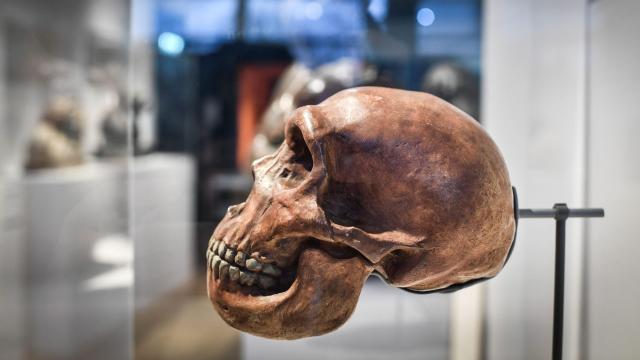Americans continue to have a challenging relationship with science, modern medicine, and at times reality, but a review of annual surveys from 1985 to 2019 does yield some good news: Over half of surveyed participants believed in the science of evolution. That’s a win, I guess.
Nearly a century ago, the Scopes trial of 1925 pitted a science teacher and his curriculum (which included evolutionary theory) against the state of Tennessee, which had just banned the subject in schools because, they said, it contradicted the Bible’s creation story. Evolutionary theory is the idea that living organisms change over time, adapting to their environments through a process called natural selection. The naturalist Charles Darwin observed and chronicled such adaptations in the beaks of finches in the Galapagos Islands. Like every other living thing, humans have evolved over time, and it’s that fact that certain folks seem to take the most issue with.
Over the decades, more and more Americans have accepted evolution by natural selection as a driving force of life on Earth. For a long time, though, the split was pretty much half-and-half, but a new study from the University of Michigan has found that the deniers are finally in the minority. The paper — published this week in the journal Public Understanding of Science — looked at opinions on evolution in public opinion surveys conducted since 1985. It found that a recent surge has pushed Americans over the halfway line in believing in the theory put forth by Darwin in his 1859 book On the Origin of Species.

“From 1985 to 2010, there was a statistical dead heat between acceptance and rejection of evolution,” said Jon D. Miller, a researcher who specialises in public understanding of science at the Institute for Social Research at the University of Michigan and lead author of the paper, in a university press release. “But acceptance then surged, becoming the majority position in 2016.”
The surveys analysed by the team were conducted by the National Science Board, NASA, and subsidiaries of the National Science Foundation, which posed the following statement to American adults to agree or disagree with: “Human beings, as we know them today, developed from earlier species of animals.” For the first 20 years of the study, the yes-and-no results were pretty even. Not so anymore: 54% of survey participants agreed with the statement in 2019.
In a time filled with disinformation, distrust of expertise, and utter foolishness, some folks previously not keen on the idea of evolution have decided it’s not so bad. Maybe it’s because denialists have moved on to hotter topics like covid-19 and climate change. Evolution is just… old hat, perhaps.
Though the number of participants who identified as religious fundamentalists declined in the last decade, the research team found that even those individuals have started to come around. In 1988, only 8% of self-described fundamentalists accepted evolution; in 2019, the number was 32%.
Co-author Mark Ackerman noted that more than twice as many Americans had college degrees in 2018 than in 1988; while that may play a role, the more clear-cut connection is political. In 2019, the most recent year included in the work, only 34% of people who identified as conservative Republican said they accepted evolution, while 83% of people who identified as liberal democrats said the same.
More: Pope Rails Against Intelligent Design, Says God “Isn’t A Magician”
